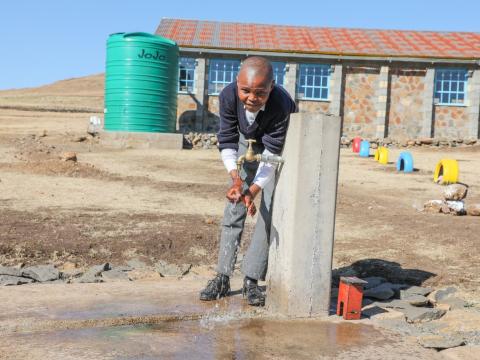World Vision Transforms Tsila Ntso Primary School through The Gift of Clean Water

By: Reentseng Phephetho, Communications and Digital Officer, Lesotho
In the remote mountains of Mokhotlong district, Tsila Ntso Primary School faced a serious challenge: they didn’t have clean and safe water. This scarcity made every aspect of their daily life in school hard, from maintaining food hygiene, to staying clean. Without clean water, students couldn’t wash their hands properly before eating, which increased the risk of contamination and illnesses. This was especially hard for girls, as it made maintaining hygiene during menstrual periods difficult, affecting their school attendance and putting them at a disadvantage from their peers.
“We had to walk far to fetch water from the spring, but the real problem was that we all had to use the same basin to wash our hands, which isn’t good,” said Keketso Kolumela, 13 years- Minister of Hand Hygiene in the school’s Wash Club.
The absence of clean water created numerous difficulties for the students. Girls, unable to maintain their hygiene during their menstrual periods, often stayed home from school during their periods. And during the COVID-19 pandemic, it was challenging for the students to practice proper handwashing, which was a critical measure against the spread of the disease.
The long walks to the distant spring not only took valuable time away from their studies and play but also exposed them to risk of potential accidents or injuries without anyone nearby to assist.
Food hygiene was another challenge. Students ate from dirty lunchboxes and often there was no clean water to wash the vegetables prepared for their meals, increasing the risk of illnesses. The lack of water was not just an inconvenience; it was a constant threat to the children’s health and education.
Recognizing the severe impact of this issue and driven by the conviction that every child deserves access to safe water and a clean environment, World Vision Lesotho stepped in to address the water scarcity. Through the Water, Sanitation, and Hygiene (WASH) Programme, World Vision assessed the needs of Tsila Ntso Primary School and provided a water system benefiting 124 children.
With this new water system, the school saw immediate improvements. A tap was constructed, and water tanks provided. Wash Clubs were introduced, playing a crucial role in promoting hygiene and instilling a sense of responsibility among students. These clubs taught handwashing techniques and food safety, equipping students s to lead by example by sharing this knowledge with their peers.
“Now we can keep clean at school. We eat from clean lunchboxes because we have clean water. I make sure that the food prepared for the students is clean,” remarked Motselisi Likhama, a 13-years - Minister of Food Hygiene from the Wash Club.
This intervention has significantly improved the hygiene and safety of the children at Tsila Ntso Primary School. They no longer need to make the perilous journey to fetch water. They can now wash their hands with clean, running water, and girls can attend school even during their menstrual periods, knowing they can maintain their hygiene.
Keketso, the Minister of Hand Hygiene, proud of his role in the WASH club shared: “I take students to the taps and show them how to wash their hands the right way.” Other Wash Club members have made it their mission to spread hygiene education, even requesting time during school assemblies to teach their peers.
The students are deeply grateful. With clean water now available, they can focus on learning without the constant worry of fetching water or maintaining basic hygiene. Their well-being is restored, and their future looks brighter thanks to World Vision Lesotho, and the dedication of the students and teachers at Tsila Ntso Primary School. A new chapter has begun, one where clean water and hope flow freely.